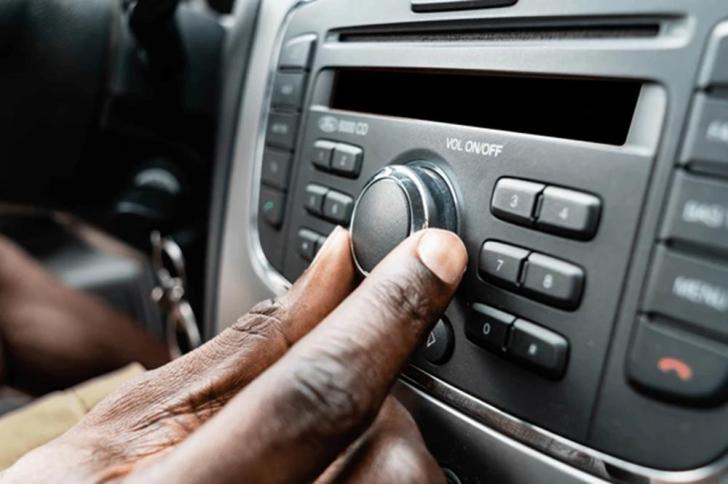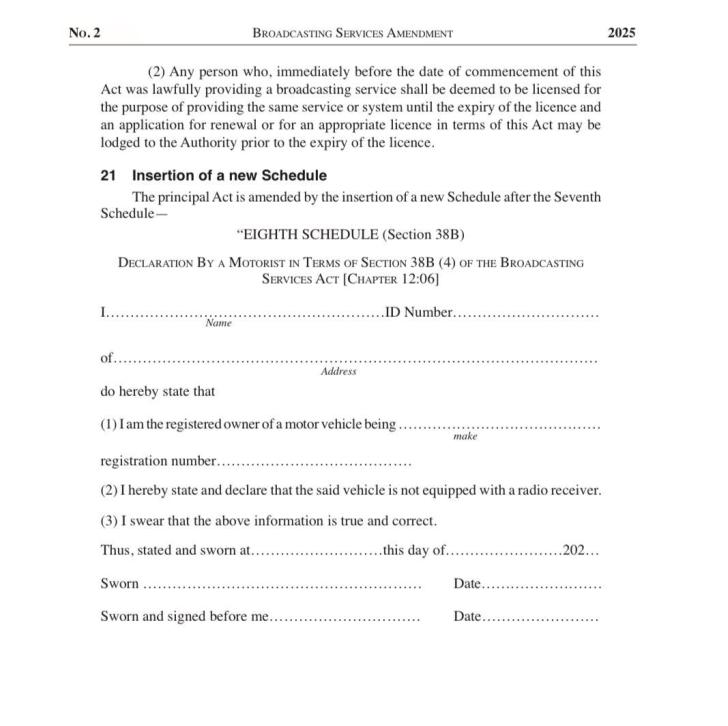Opinion / Columnist
How to avoid paying US$92 ZBC car radio licence the legal way
28 May 2025 at 11:29hrs |
0 Views

Zimbabwean drivers are now legally required to pay US$92 a year for a car radio licence from the Zimbabwe Broadcasting Corporation (ZBC) before they can renew their vehicle licences or insurance. But if your car doesn't have a radio - or it's been removed - you don't have to pay a cent.
Here's a step-by-step guide on how to avoid paying the US$92 ZBC radio licence fee legally under the new 2025 law.
Step 1: Understand the new law
The requirement is part of the Broadcasting Services Amendment Act (No. 2 of 2025), which came into effect in May 2025. The law says you must either:
Hold a valid ZBC radio licence OR
Have a valid exemption certificate issued by ZBC
Otherwise, you won't be able to renew your ZINARA vehicle licence or your motor insurance.
Government spokesperson Nick Mangwana confirmed this on 28 May 2025, posting on X:
“ZINARA and every motor insurance company shall only issue a motor vehicle licence and motor insurance policy respectively to individuals and companies who either hold a current radio licence issued by the Zimbabwe Broadcasting Corporation (ZBC) OR A VALID EXEMPTION CERTIFICATE FROM ZBC unless the vehicle to be insured is not equipped with a radio receiver.â€
Step 2: Confirm your vehicle has no radio
The exemption is only allowed if your vehicle does not have a radio receiver.
This can include:
Vehicles where the factory-fitted radio has been removed
Older models that were never fitted with a radio
Certain work or utility vehicles
Important: You must be honest. If you lie on the declaration, it could lead to legal consequences under perjury laws.
Step 3: Fill out the official declaration
The exemption is granted based on a sworn declaration outlined in the Eighth Schedule of the new law. This is what it looks like:
Declaration by a Motorist in Terms of Section 38B (4)

The declaration must be signed under oath and in the presence of a Commissioner of Oaths. You can usually find one at police stations, law firms, courts, or even some post offices.
Step 4: Submit your declaration to ZBC
Once sworn and signed, submit the declaration to ZBC offices or agents. They will issue you with a valid exemption certificate.
This exemption certificate allows you to:
Renew your ZINARA licence
Buy or renew your car insurance policy
… without paying the US$92 annual ZBC radio licence fee.
Step 5: Keep the exemption certificate safe
You'll need to present the exemption certificate whenever you renew your vehicle licence or insurance. Keep both a physical copy and a scanned digital copy as backup.
What happens if you don't have an exemption?
If you don't have either:
A valid ZBC radio licence, or
A valid exemption certificate
… then you won't be able to register your car or buy insurance.
This could leave your vehicle off the road - or worse, get you into trouble for driving unlicensed and uninsured.
Why this matters
ZBC is expected to collect millions through this change. With over 1.2 million registered vehicles in Zimbabwe, and a US$92 annual licence fee, ZBC could earn over US$100 million a year if everyone complies.
But for motorists who don't have a radio receiver, the law provides a clear, legal way to avoid the fee.
Here's a step-by-step guide on how to avoid paying the US$92 ZBC radio licence fee legally under the new 2025 law.
Step 1: Understand the new law
The requirement is part of the Broadcasting Services Amendment Act (No. 2 of 2025), which came into effect in May 2025. The law says you must either:
Hold a valid ZBC radio licence OR
Have a valid exemption certificate issued by ZBC
Otherwise, you won't be able to renew your ZINARA vehicle licence or your motor insurance.
Government spokesperson Nick Mangwana confirmed this on 28 May 2025, posting on X:
“ZINARA and every motor insurance company shall only issue a motor vehicle licence and motor insurance policy respectively to individuals and companies who either hold a current radio licence issued by the Zimbabwe Broadcasting Corporation (ZBC) OR A VALID EXEMPTION CERTIFICATE FROM ZBC unless the vehicle to be insured is not equipped with a radio receiver.â€
Step 2: Confirm your vehicle has no radio
The exemption is only allowed if your vehicle does not have a radio receiver.
This can include:
Vehicles where the factory-fitted radio has been removed
Older models that were never fitted with a radio
Certain work or utility vehicles
Important: You must be honest. If you lie on the declaration, it could lead to legal consequences under perjury laws.
Step 3: Fill out the official declaration
The exemption is granted based on a sworn declaration outlined in the Eighth Schedule of the new law. This is what it looks like:
Declaration by a Motorist in Terms of Section 38B (4)

The declaration must be signed under oath and in the presence of a Commissioner of Oaths. You can usually find one at police stations, law firms, courts, or even some post offices.
Step 4: Submit your declaration to ZBC
Once sworn and signed, submit the declaration to ZBC offices or agents. They will issue you with a valid exemption certificate.
This exemption certificate allows you to:
Renew your ZINARA licence
Buy or renew your car insurance policy
… without paying the US$92 annual ZBC radio licence fee.
Step 5: Keep the exemption certificate safe
You'll need to present the exemption certificate whenever you renew your vehicle licence or insurance. Keep both a physical copy and a scanned digital copy as backup.
What happens if you don't have an exemption?
If you don't have either:
A valid ZBC radio licence, or
A valid exemption certificate
… then you won't be able to register your car or buy insurance.
This could leave your vehicle off the road - or worse, get you into trouble for driving unlicensed and uninsured.
Why this matters
ZBC is expected to collect millions through this change. With over 1.2 million registered vehicles in Zimbabwe, and a US$92 annual licence fee, ZBC could earn over US$100 million a year if everyone complies.
But for motorists who don't have a radio receiver, the law provides a clear, legal way to avoid the fee.
Source - online
All articles and letters published on Bulawayo24 have been independently written by members of Bulawayo24's community. The views of users published on Bulawayo24 are therefore their own and do not necessarily represent the views of Bulawayo24. Bulawayo24 editors also reserve the right to edit or delete any and all comments received.
Join the discussion
Loading comments…































